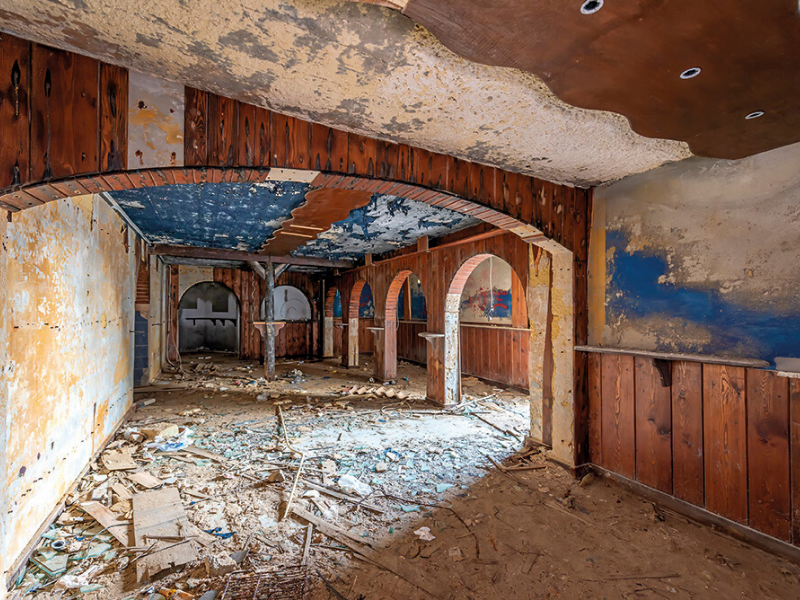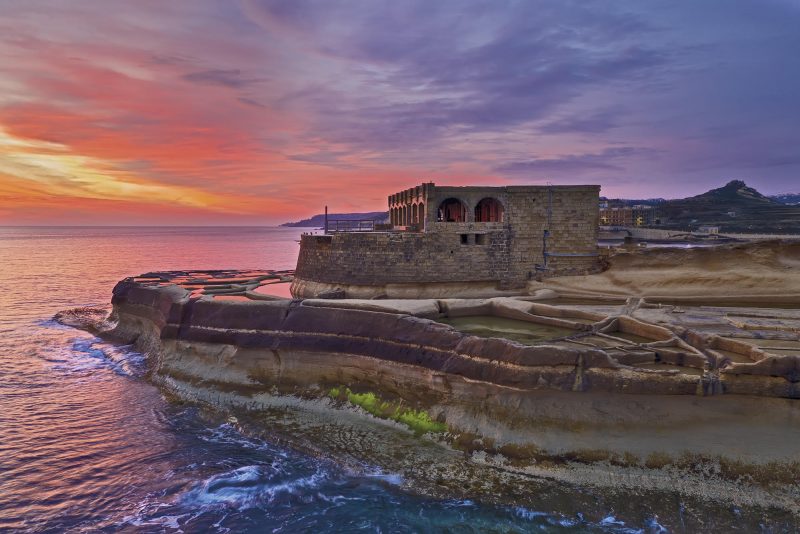The government’s bureaucratic delays in granting the guardianship of four deteriorating historic sites to Din L-Art Ħelwa have not been explained, raising costs and risking the loss of funding, according to DLĦ President Professor Alex Torpiano.
The sites have been awaiting the government to transfer them over for years, with DLĦ having already secured funding, research and permits for their restoration.
Asked by The Shift about the cause behind the hold-up, Torpiano said he “cannot explain the delays. I simply do not understand them”.
DLĦ specifically urged Lands Authority Minister Silvio Schembri and National Heritage, Arts & Local Government Minister Owen Bonnici to finalise the bureaucratic proceedings.

The area that was used as a bar in the Qbajjar venue. Photo: Daniel Cilia.
DLĦ was told that “the delays were related to the workload at the Lands Authority”, but Torpiano said it could be possible there are other issues, considering it “unlikely that at least one of these sites is not cleared for the signing of the Guardianship Agreement.”
Torpiano, also the Dean of the University of Malta’s Faculty for Built Environment, said, “The delay implies that the places continue to deteriorate, thus losing more original material and making the cost of restoration even higher.”
He added that there is also a risk that “sponsors lose interest in the project and therefore do not follow through with their support”.
The Shift is also informed that there has been no response or action from government authorities since a DLĦ press release calling attention to the issue on 25 February, despite the media coverage and the time-sensitive nature of the request.
The sites include the medieval chapel of San Ċir in Rabat, the Cavallerizza and the Marfa Palace, in Mellieħa and the Wied il-Qolla Battery in Qbajjar, Gozo.
The Qbajjar Battery, in particular, has been slated for DLĦ’s guardianship and restoration since at least 2021, following almost 20 years of indecision by the government and years of inaction and legal battles. Today it lies in ruins, continuing to deteriorate.
In October 2020, the medieval chapel of San Ċir was given Grade 1 protection but has similarly been left to rot since the DLĦ guardianship was never finalised, despite being applied for years earlier.

The Cavallerizza in Mellieħa also known as Ir-Razzett tax-Xjaten, is one the sites awaiting DLĦ guardianship
The Cavallerizza in Mellieħa, also known as “Ir-Razzett Tax-Xjaten” due to its distinctive dual staircases and surrounding lore, has also been left in ruins, despite being deemed of “very high” cultural heritage since at least 2012 by the Superintendence of Cultural Heritage.
The Marfa Palace, known as il-Palazz L-Aħmar or the Wied Musa Battery has similarly been left in limbo, with DLĦ having submitted to the SCH for its guardianship since July 2020.

Another site awaiting guardianship, the Marfa Palace in Mellieħa – Photo: Pinterest














Unless they pocket the proceeds nothing moves.
Remember Fort Sant Anglu was turned into a club with pool by Lorry Sant and gang. Nothing has changed. The same DNA is genetic in the Labour Party. Frame ups , killings , destruction of heritage , theft of heritage , selling Malta to foreigners, from MIntoff’s Integration , to Muscat’s Nationality Passports for Cash and a cut.
That is really spot on, all of it, especially the last line.
How exactly the former PN governments not left major parts of our heritage in ruins or tried to profit or rebuild? Each one of the above PN did the exact same and worse ruined Vallettas entrance and left the rest to rot just like PL
Well lets face it. If you speak of DNA you can hardly say yours is different from your Maltese brothers and sisters.
There is a difference between a party who neglects old buildings from the colonial past which were for military purpose as Malta was a military base for 150 years on ideological grounds, and a party who has to continue with the transformation of the country from military purposes to civil economy.
The MLP has, since Dom Mintoff took over its leadership in 1949, was in contrast to Paul Boffa, who was rather getting on well with the British, developed an anti-British sentiment which manifestated itself after the ‘Malta’s integration with the UK’ was rejected during Mintoff’s first term as PM in the 1950s..
The PN from its very foundation was always opposing British rule in Malta, transformed from pro-Italian to ‘Malta independent only’ and stuck with it. Despite that fact, it rather get on well with the British after WWII. It needed a man with diplomatic skills like George Borg Olivier to gain Malta’s independence.
Different times and different circumstances. Fact is that both parties contributed to the way Malta has developed itself from a colonial past to the present. When DNA comes in to all that, it certainly reflects on both parties, as well as the positives and negatives. But this sellout of the country as seen during the past ten years, has really no precedent as it goes far beyond any history record.
Apart from my experiences that the many people who, for what reason ever, have some negative attitude towards the colonial past of Malta and this includes buildings and everything that reminds one on that era, are among the PLers. Their taste is, in regards of preserving heritage of old Malta’s architecture, non-existing. Though they don’t object the uglification of Malta by all the concrete buildings popping up like mushrooms. And they pretend to ‘love’ Malta. I don’t believe them because they don’t act like it.
It’s those people who preserve everything they can resque from building sites, like tiles and other stuff, to save it from being lost entirely. They show what Malta means to them, and it means a lot. But they also have to witness the neglect and sellout of Malta’s heritage by the PL elite.
The PL “Elite” one has to ask just what that is? From where I’m sat they are in fact a collection of consiglieri’s who are all trying to outdo each other in the destruction of colonial Malta. Their hatred of the British is well documented and derives from the Brits ability and expertise to train / teach and implement, engineering, architectural, legal and medical skills across the Maltese population, something that they can NEVER achieve due to their personal greed and hatred of their fellow Maltese.
No objection to what you said about the PL Elite. In regards of the old traditional Maltese architecture, it goes far back before the British era in Malta.
The city of Valletta for example, is though by Italian architects, of the Baroque epoche (1650 – 1750).
British influence on architecture in Malta was mostly done on and for military buildings, which includes the improvement of Fortifications first built of the Knights of St John who ruled Malta from 1530 to 1798. With a short time of occupation by revolutionary France, the British de facto took over Malta (but the Maltese managed to throw out the French by themselves and declaring Malta independent) in 1800 de facto and formally in 1815, the British declared Malta a crown colony of their own. That era lasted until 1964 when Malta became an independent state and ten years afterwards a Republic in 1974 with the British Forces leaving for good in 1979.
I would rather describe the relationship between Malta and the UK and vice versa as something like an ambivalent one. But further explanations on my part would lead too far from here as it is more a matter of history.
I have read some articles about the craftmanship of the Maltese and their knowledge in architecture that was always in line with the climate that shaped Malta and its people and this was also a major point when Valletta was built. These people knew how to build and be in line with the tides and the changing of the climate during the seasons. A knowledge that isn’t forgotten, but just thrown out of the window for the purpose of quick money and not using the natural source for building which is limestone, but concrete instead. Just imagine the decades before air conditioning was invented. People knew how to handle the heat in summer and the cold in winter, even when compared to other European countries north of the Alps, the temperatures are mild and rarely fall sub zero.
I use to read the history articles in the Times of Malta which are always interesting and telling. But as you pointed out, some people have their own ways and rather ignore the past and therefore refuse to learn fom it.
I am of the stance that normally, the Maltese know how to get on with their life and the circumstances of their environment. At least many generations of old knew it and handed it down to the next. Profiteering has rather put that knowledge on the ‘backburner’ and that is a problem that will certainly last for the future in Malta. They are not stupid, but somehow, some say that they are easily misled. The present PL era sinc 2013 is just another example for that, just that this time, like in the past decades since independence, it is of their own making and not to blame on any other foreign nation.
Too busy selling off Malta piecemeal, and probably no backhanders to be had here.
Probably the Lands Authority is more interested in turning these properties into commercial sites as is happening in the harbour area, obviously by the private sector/construction industry.
There’s no chance of anybody making any sort of kickback should these properties be handed over to some NGO now is there?
So, as per standard Labour policy, let’s keep them on ice until some developer close to the regime coughs up enough to make somebody‘s day!
No, not the country’s day, but somebody’s!